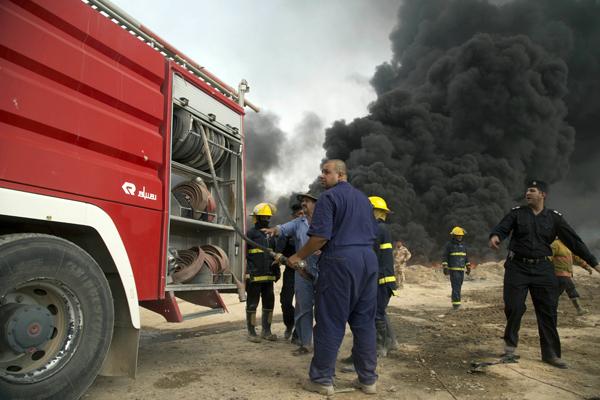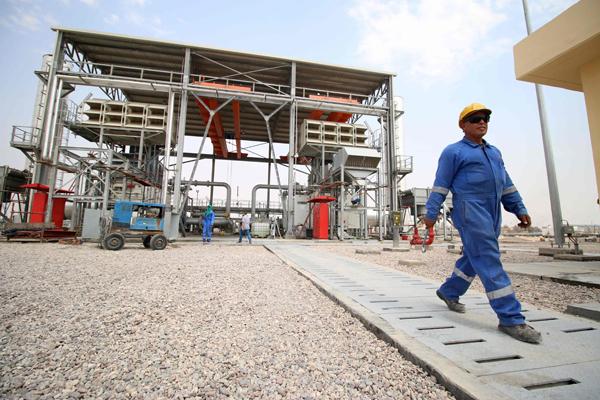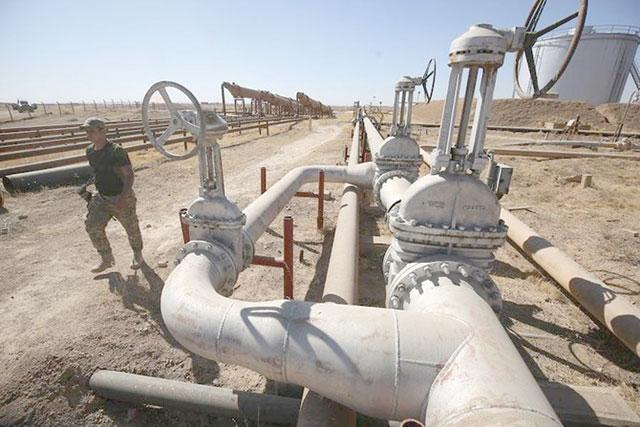You are here
Iraq, Kurdistan jointly export Kirkuk oil again
By Reuters - Sep 01,2016 - Last updated at Sep 01,2016

In this Wednesday photo, Iraqi firefighters battle large fire at oil wells as they are trying to prevent the flames from reaching the residential neighbourhoods in Qayyarah, Iraq (AP photo)
LONDON — Iraqi state oil firm SOMO and Iraq's semi-autonomous region of Kurdistan have begun jointly exporting crude oil from the giant Kirkuk oilfield again after cutting a preliminary deal on revenue-sharing, trading sources said on Thursday.
The development signals a breakthrough in relations between Baghdad and Erbil, which have been disputing how to share oil and budget revenues for several years amid fiscal problems on both sides and their fight against the terror group, Daesh, militants.
The Kirkuk flows, usually amounting to 150,000 barrels per day and exported via the Turkish Mediterranean port of Ceyhan, had been suspended since March as Baghdad pushed Kurdistan to cut a new deal.
Before March, Kirkuk flows were unilaterally handled by Kurdistan. SOMO, the State Oil Marketing Organisation, had seen no cargoes exported on its behalf from Ceyhan since mid-2015, when Kurdistan began independent sales of its own crude and Kirkuk oil.
"Shipments on behalf of SOMO have resumed as of six o'clock this morning... While final details of the revenue-sharing deal are still being worked out, the current flows of Kirkuk are being split 50/50 between SOMO and Kurdistan," one shipping source familiar with the operations said.
Besides Kirkuk, Kurdistan produces around 500,000 barrels per day of crude from its own fields and those will still be marketed independently by the semi-autonomous region.
But the compromise over Kirkuk could be the first step towards a comprehensive deal involving all Kurdish oil.
Baghdad has insisted SOMO is the only entity that can market Iraqi crude. Kurdistan started independent exports after accusing Baghdad of not respecting a previous revenue-sharing deal and not transferring enough money from the federal budget.
Baghdad, which exports most of its oil from the Gulf, has said Erbil was not exporting enough crude under that deal.
Kurdistan urgently needed Kirkuk flows to resume because its own exports do not cover its budget needs, forcing the region to borrow billions of dollars from Turkey, oil firms and trading houses guaranteed by future oil sales.
Lost revenues from the halt in Kirkuk flows had been estimated at more than $1 billion since March.
Last week, Baghdad said that if a new revenue deal were not reached, oil from Kirkuk could be exported by truck via Iran. This week, SOMO blacklisted three ships involved in exporting Kurdish oil.
However, a meeting between Iraqi Prime Minister Haider Al Abadi and Nechirvan Barzani, prime minister of the Kurdistan regional government, seems to have broken the ice this week with a preliminary deal reached on Kirkuk oil.
The trading source said final details on how to split the Kirkuk flows could be worked out by mid-September.
Ezat Sabir, head of the Finance Committee in the Kurdish Council of Ministers, said his understanding was that the 50/50 split of Kirkuk oil would remain until the year-end, after which Baghdad and Erbil would try to return to full revenue-sharing.
Erbil has said it was ready to hand over all oil exports to SOMO if Baghdad agreed to transfer $1 billion to Erbil from the federal budget each month.
Related Articles
BAGHDAD — Iraq's government would consider selling crude through Iran should talks with the autonomous Kurdish region on an oil revenue-shar
Iraq’s top minister responsible for energy affairs on Saturday criticised the autonomous Kurdish region’s push towards exporting oil independently of Baghdad, calling it a grey area lacking in transparency.
BAGHDAD — Iraq's federal authorities and the cash-strapped Kurdish regional government (KRG) have relaunched talks over longstanding oil and













